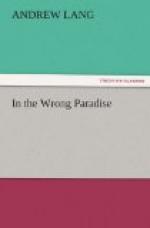Thus, among the young native men and maidens, in the windings of the mazy dance, might have been seen disporting himself, a person of stalwart form, whose attire still somewhat faintly indicated his European origin and sacred functions. A hymn-book in my hand instead of a rattle (used by the natives), I capered gaily through their midst. Often and often I led the music, instructing my festive flock in English hymns, which, however, I adapted to gay and artless melodies, such as “There’s some one in de house wid Dinah!” or “Old Joe kicking up behind and afore!”
This kind of entertainment was entirely new to the natives, who heartily preferred it to their own dull music, resembling what are called, I believe, “Gregorians,” by a bloated and Erastian establishment.
So far, then, I may perchance trust that my efforts were not altogether vain, and the seed thus sown may, in one or two cases, have fallen on ground not absolutely stony. But, alas! I have little room for hope.
I pursued my career of unblushing “economy”—as the Jesuits say, meaning, alas! economy of plain truth speaking—and of heathen dissipation. Few were the dances in which I did not take a part, sinking so low as occasionally to oblige with a hornpipe. My blue ribbon had long ago worn out, and with it my strict views on Temperance. I acquired a liking for the strange drink of the islanders—a thick wine and water, sometimes mixed with cheese and honey. In fact, I was sliding back—like the unfortunate Fanti missionary, John Greedy, M.A., whose case, as reported by precious Mr. Grant Allen, so painfully moved serious circles—I was sliding back to the level of the savagery around me. May these confessions be accepted in the same spirit as they are offered; may it partly palliate my guilt that I had apparently no chance of escape from the island, and no hope beyond that of converting the natives and marrying Doto. I trusted to do it, not (as of old) by open and fearless denunciation, but by slowly winning hearts, in a secular and sportive capacity, before gaining souls.
Even so have I seen young priests of the prelatical Establishment aim at popularity by playing cricket with liberal coal-miners of sectarian persuasions. They told me they were “in the mission field,” and one observed that his favourite post in the field was third man. I know not what he meant. But to return to the island.
My career of soul-destroying “amusement” (ah, how hollow!) was not uninterrupted by warnings. Every now and again the mask was raised, and I saw clearly the unspeakable horrors of heathen existence.




